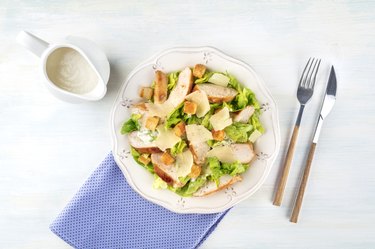
Figuring out how much to eat in a day is quite complex. If you're a 120-pound woman, you can estimate your daily calorie needs by figuring out approximately how many calories you're burning. Then, you can tailor your energy intake to your fitness goals.
Tip
The number of calories a 120-pound woman should consume daily depends on her fitness goals and energy expenditure.
Video of the Day
Whether you want to lose, gain or maintain your body weight, everything depends on energy balance, according to the National Institutes of Health. If you eat more calories than you burn, you'll gain weight. If you torch more calories than you take in, you'll lose weight. If those numbers are the same, you'll maintain your body weight.
Video of the Day
Read more: Recommended Caloric Intake for Weight Loss
120-Pound Woman Energy Requirements
The number of calories you burn in a day depends on your metabolism and activity level. Your resting metabolic rate is the amount of energy your body uses at rest. It includes the energy your organs use just to keep your body running. You can calculate this number by using the Harris-Benedict equation.
The Harris-Benedict equation is a formula that uses your height, weight, age and gender to estimate your resting metabolic rate. For example, a 40-year-old 120-pound woman who stands 5 feet and 3 inches tall has an estimated resting metabolic rate of 1,286 calories.
Once you've calculated your resting metabolic rate, you have to figure out your activity level. You can use a step counter on your phone or watch to monitor your steps for the day. These calculators typically estimate your energy expenditure based on your activity level.
You also have to factor in the number of calories you burn in the gym. Harvard Health Publishing provides the estimated calories burned by activity and body weight.
Based on this data, a 125-pound person would burn 270 calories in 30 minutes on the elliptical, or 300 calories in 30 minutes while running at 6 miles per hour. Keep in mind that body weight matters when measuring activity, so a 120-pound girl burns less than a 180-pound one doing the same activity.
Another factor that affects your energy expenditure is non-exercise activity thermogenesis. As you go through your day, you do little activities like cleaning the dishes or carrying grocery bags. These activities don't count as exercise, but they do burn calories. Once you've added up all your activity for the day and your resting metabolic rate, you'll have an idea of how many calories you burn in a day.
To keep things simple, use an online calculator which will tell you how many calories to consume per day based on your goals. For example, if you are 120 lbs, simply input your goal, height and gender to calculate your ideal energy intake. Keep in mind that all calculators are giving you estimates, so the numbers they provide may not be 100 percent accurate.
Read more: Calories, Weight and Height According to Age
Food Quality Matters
Whether you lose or gain weight comes down to energy balance, but the quality of the food you eat still matters. For example, eating a candy bar versus eating fruits. The sugar in candy bars digests quickly, whereas the fiber from fruits slows down sugar absorption into the bloodstream. Fiber makes you feel fuller, which can ultimately help you eat less and lose weight.
An April 2017 study published in the FASEB Journal showed that increasing fiber intake by 10 grams per day helped subjects lose more weight. This shows that what you eat is important, so instead of simply focusing on how many calories you take in, focus instead on the types of food you're eating.
Keep in mind that drastically reducing your calorie intake can slow your metabolism and lead to nutrient deficiencies, among other side effects. If you decide to lower your calorie intake, it's better to do so gradually. Start by cutting 300 to 500 calories per day, track your progress and adjust your diet accordingly.
- Academy of Nutrition and Dietetics: "4 Ways Low-Calorie Diets Can Sabotage Your Health"
- FASEB Journal: "Fiber Intake, Dietary Energy Density, and Diet-Type Predict 6-Month Weight-Loss in Free-Living Adults Who Adhered to Prescribed Macronutrient and Energy Composition of Varying Diets"
- Harvard Health Publishing: "Calories Burned in 30 Minutes for People of Three Different Weights"
- Cornell University: "Basal Energy Expenditure: Harris-Benedict Equation"
- National Heart, Lung, and Blood Institute: "Balance Food and Activity"
- American Journal of Critical Care: "Harris-Benedict Equation and Resting Energy Expenditure Estimates in Critically Ill Ventilator Patients"
- Omni Calculator: "Harris-Benedict Calculator"
- Joslin Diabetes Center: "How Does Fiber Affect Blood Glucose Levels?"